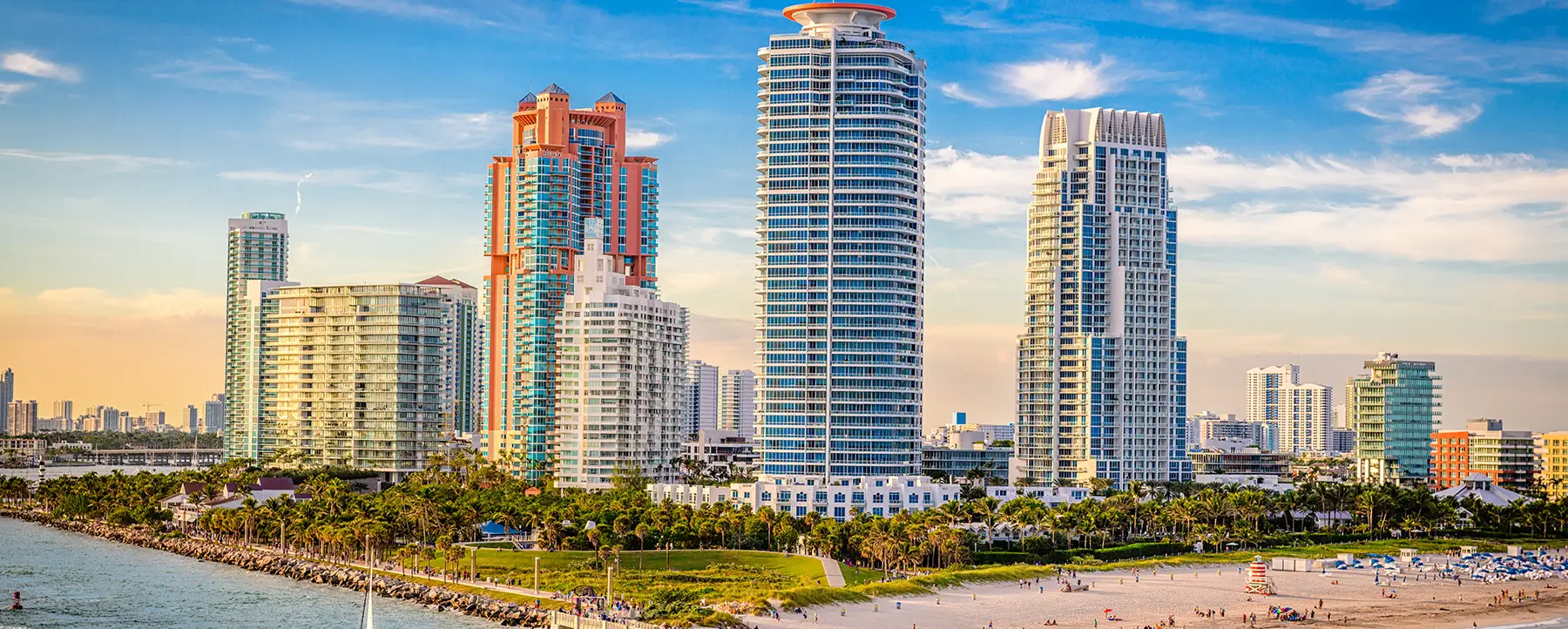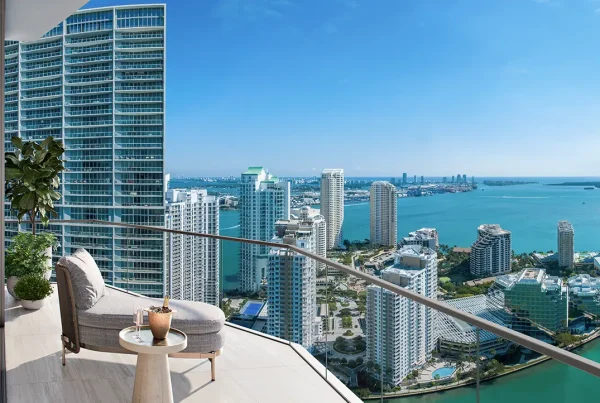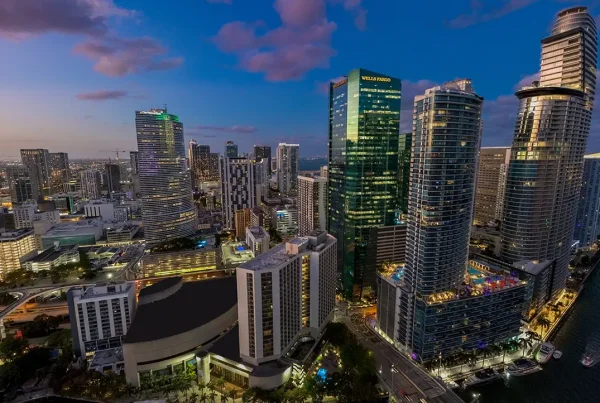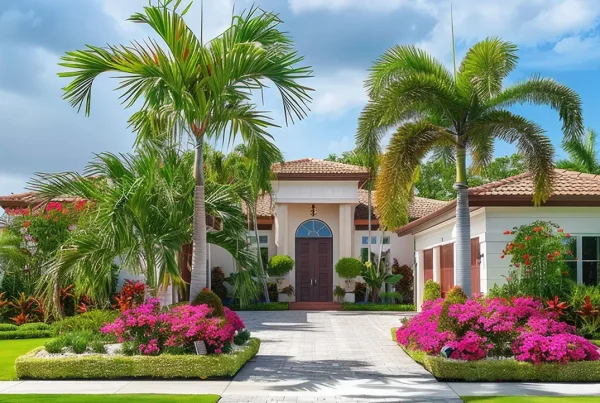Miami is one of the most sought-after destinations in the world for vacation homes. From oceanfront condos in Miami Beach to luxury villas in Coral Gables, owning a vacation home here combines personal enjoyment with investment potential. But buying a vacation property requires careful planning—understanding local markets, rental rules, financing options, and ongoing costs. This guide covers everything you need to know to purchase the perfect vacation home in Miami.
Why Buy a Vacation Home in Miami?
- World-Class Lifestyle: Beaches, boating, fine dining, and vibrant nightlife.
- Global Appeal: Attracts visitors year-round from the U.S. and abroad.
- Strong Rental Market: Vacation rentals generate income when the property isn’t in use.
- Tax Benefits: Florida has no state income tax, making it attractive for second-home buyers.
- Appreciation Potential: Miami real estate continues to show long-term growth.
Get the Miami Buyers Guide
Thinking about buying in Miami? Download our free guide to learn what to expect, what to avoid, and how to buy smart in today’s market.
Step 1: Deciding on the Right Property Type
Vacation homes in Miami come in all shapes and sizes: – Condos: Low-maintenance, resort-style amenities, easy lock-and-leave. – Single-Family Homes: More privacy, space for families, and customizable features. – Luxury Villas & Waterfront Homes: Premium lifestyle, direct ocean or bay access, strong rental appeal.
Pro Tip: Consider how often you’ll use the property. Frequent visitors may prefer condos for convenience, while long-term stays favor single-family homes.
Step 2: Best Neighborhoods for Vacation Homes
- Miami Beach: Iconic for beachfront condos and luxury rentals.
- Brickell & Downtown: Trendy for professionals, great city lifestyle.
- Coconut Grove: Relaxed, family-friendly, with lush green spaces.
- Coral Gables: Classic architecture, upscale living.
- Sunny Isles Beach: Luxury towers and international appeal.
- Key Biscayne: Exclusive island living, privacy, and nature.
Step 3: Financing a Vacation Home
Financing a second home is different from financing a primary residence:
- Higher Down Payments: Typically 20–30% required.
- Interest Rates: May be slightly higher than for primary residences.
- Rental Use Considerations: If you plan to rent the property, lenders may treat it as an investment property, requiring stricter terms.
Pro Tip: Work with a lender experienced in second home and investment loans in Florida.
Step 4: Rental Potential & Rules
Many Miami buyers offset costs by renting their vacation home when not in use. However, rental rules vary widely:
- Short-Term Rentals (Airbnb, VRBO): Some areas allow them, others have strict restrictions.
- Condo Rules: Many associations ban rentals under 6 months.
- Licensing Requirements: Short-term rentals may require permits and registration with the city.
Action Step: Confirm local laws and HOA rules before buying if rental income is part of your strategy.
Step 5: Costs of Owning a Vacation Home
- Property Taxes: Average around 1% of the assessed value.
- Insurance: Windstorm, flood, and homeowner’s insurance may all apply.
- HOA Fees: Condos and gated communities charge monthly fees.
- Maintenance: Landscaping, pool service, and property management if rented.
Step 6: Property Management Options
If you won’t live in Miami year-round, consider:
- Vacation Rental Management Companies: Handle bookings, cleaning, and guest support.
- Traditional Property Managers: Manage maintenance and long-term leases.
- Hybrid Solutions: Companies offering flexible short- and long-term rental services.
Step 7: Legal & Tax Considerations
- Homestead Exemption: Only applies to primary residences, not vacation homes.
- Capital Gains: Applies if you sell at a profit.
- Tax Deductions: Mortgage interest and property taxes may be deductible; check with a tax advisor.
- International Buyers: FIRPTA (Foreign Investment in Real Property Tax Act) applies.
Step 8: Closing the Deal
Buying a vacation home in Miami follows a similar process to primary residences:
- Work with a local real estate expert.
- Make an offer and place deposit in escrow.
- Conduct inspections and review condo docs (if applicable).
- Secure financing or finalize cash purchase.
- Close and take ownership.
Frequently Asked Questions
How much rental income can a Miami vacation home generate?
Income varies by location, property type, and season. Beachfront condos often generate the highest rental yields.
Is buying a vacation home in Miami a good investment?
Yes. Miami’s global appeal, strong tourism, and tax benefits make vacation homes attractive for both lifestyle and investment.
What are the best neighborhoods for vacation rentals?
Miami Beach, Brickell, Sunny Isles, and Key Biscayne are top choices for rental demand and lifestyle.
Can I finance a vacation home purchase?
Yes, but expect 20–30% down payments and stricter terms than primary residences.
How do I manage my vacation home when I’m not in Miami?
Our property management team provides complete care for your vacation home while you’re away. We handle regular maintenance, inspections, cleaning, and security, as well as rental management if you choose to generate income. From coordinating repairs to ensuring your home is guest-ready at all times, we act as your local partner in Miami so you can enjoy peace of mind knowing your property is professionally managed.
Conclusion
Owning a vacation home in Miami offers the best of both worlds: a personal retreat in a world-class city and an investment opportunity in a high-demand market. With careful planning, you can find a property that fits your lifestyle and financial goals.
